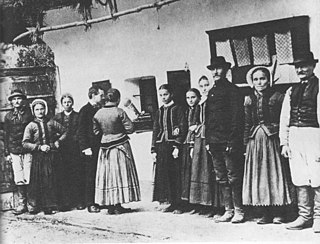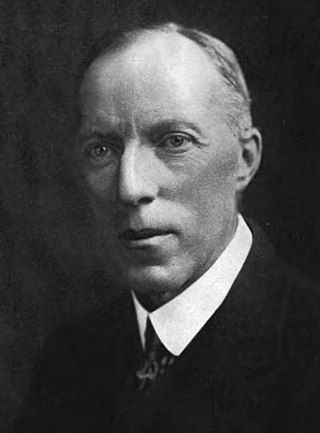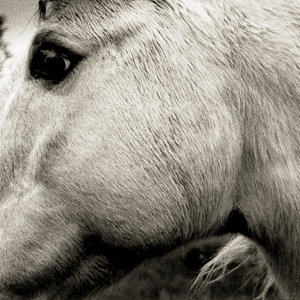Related Research Articles

A ballad is a form of verse, often a narrative set to music. Ballads derive from the medieval French chanson balladée or ballade, which were originally "dance songs". Ballads were particularly characteristic of the popular poetry and song of Britain and Ireland from the Late Middle Ages until the 19th century. They were widely used across Europe, and later in Australia, North Africa, North America and South America.

Folk music is a music genre that includes traditional folk music and the contemporary genre that evolved from the former during the 20th-century folk revival. Some types of folk music may be called world music. Traditional folk music has been defined in several ways: as music transmitted orally, music with unknown composers, music that is played on traditional instruments, music about cultural or national identity, music that changes between generations, music associated with a people's folklore, or music performed by custom over a long period of time. It has been contrasted with commercial and classical styles. The term originated in the 19th century, but folk music extends beyond that.

The term American folk music encompasses numerous music genres, variously known as traditional music, traditional folk music, contemporary folk music, vernacular music, or roots music. Many traditional songs have been sung within the same family or folk group for generations, and sometimes trace back to such origins as the British Isles, Mainland Europe, or Africa. Musician Mike Seeger once famously commented that the definition of American folk music is "...all the music that fits between the cracks."

"Barbara Allen" is a traditional folk song that is popular throughout the English-speaking world and beyond. It tells of how the eponymous character denies a dying man's love, then dies of grief soon after his untimely death.
The folk music of England is a tradition-based music which has existed since the later medieval period. It is often contrasted with courtly, classical and later commercial music. Folk music traditionally was preserved and passed on orally within communities, but print and subsequently audio recordings have since become the primary means of transmission. The term is used to refer both to English traditional music and music composed or delivered in a traditional style.

Scottish folk music is a genre of folk music that uses forms that are identified as part of the Scottish musical tradition. There is evidence that there was a flourishing culture of popular music in Scotland during the late Middle Ages, but the only song with a melody to survive from this period is the "Pleugh Song". After the Reformation, the secular popular tradition of music continued, despite attempts by the Kirk, particularly in the Lowlands, to suppress dancing and events like penny weddings. The first clear reference to the use of the Highland bagpipes mentions their use at the Battle of Pinkie Cleugh in 1547. The Highlands in the early seventeenth century saw the development of piping families including the MacCrimmons, MacArthurs, MacGregors and the Mackays of Gairloch. There is also evidence of adoption of the fiddle in the Highlands. Well-known musicians included the fiddler Pattie Birnie and the piper Habbie Simpson. This tradition continued into the nineteenth century, with major figures such as the fiddlers Niel and his son Nathaniel Gow. There is evidence of ballads from this period. Some may date back to the late Medieval era and deal with events and people that can be traced back as far as the thirteenth century. They remained an oral tradition until they were collected as folk songs in the eighteenth century.

Cecil James Sharp was an English collector of folk songs, folk dances and instrumental music, as well as a lecturer, teacher, composer and musician. He was a key figure in the folk-song revival in England during the Edwardian period. According to Roud's Folk Song in England, Sharp was the country's "single most important figure in the study of folk song and music."
Western swing is a subgenre of American country music that originated in the late 1920s in the West and South among the region's Western string bands. It is dance music, often with an up-tempo beat, which attracted huge crowds to dance halls and clubs in Texas, Oklahoma and California during the 1930s and 1940s until a federal war-time nightclub tax in 1944 contributed to the genre's decline.

Dance in India comprises numerous styles of dances, generally classified as classical or folk. As with other aspects of Indian culture, different forms of dances originated in different parts of India, developed according to the local traditions and also imbibed elements from other parts of the country.
"Fare Thee Well" is an 18th-century English folk ballad, listed as number 422 in the Roud Folk Song Index. In the song, a lover bids farewell before setting off on a journey, and the lyrics include a dialogue between the lovers.

Dance of Zalongo Greek: Χορός του Ζαλόγγου, Horos tou Zalongou) refers to the mass suicide of Souliote women and their children that is said to have occurred in the aftermath of the invasion of Ottoman troops on Souli on December 16, 1803. The event is commemorated in Greece in the context of the Greek War of Independence. About 60 women were trapped near the village of Zalongo in Epirus during the period of Ottoman control. Rather than submit to the Ottoman troops chasing them, they decided to turn towards the cliff's edge and die with their infants and children. According to tradition, they did this one after the other whilst dancing and singing. A number of Greek theatrical dramas and a song in folk style commemorating the event are also named the Dance of Zalongo.

My Bonny Light Horseman: Being an Account of the Further Adventures of Jacky Faber, in Love and War is a historical novel written by L.A. Meyer, published in 2008. It is the sixth book in the Bloody Jack Adventure series about a teenage girl named Jacky Faber, alias Bloody Jack, set in the early 19th century.
"Oh, Dear! What Can the Matter Be?", also known as "Johnny's So Long at the Fair" is a traditional nursery rhyme that can be traced back as far as the 1770s in England. There are several variations on its lyrics. It has Roud Number 1279.

After The Break is the fourth studio album by the Irish folk music band Planxty, recorded at Windmill Lane Studios from 18 to 30 June 1979 and released the same year. It was the band's first of two releases on Tara Records.
"Blow the Wind Southerly" is a traditional English folk song from Northumbria. It tells of a woman desperately hoping for a southerly wind to blow her lover back home over the sea to her. It is Roud number 2619.
A sentimental ballad is an emotional style of music that often deals with romantic and intimate relationships, and to a lesser extent, loneliness, death, war, drug abuse, politics and religion, usually in a poignant but solemn manner. Ballads are generally melodic enough to get the listener's attention.
Bonny Light Horseman is an American folk band consisting of Anaïs Mitchell, Eric D. Johnson, and Josh Kaufman. They released their debut eponymous album in January 2020. Their sophomore album, Rolling Golden Holy, came out in October 2022. Their latest release, Keep Me On Your Mind/See You Free, was released in June 2024.

Bonny Light Horseman is the debut album by American folk supergroup Bonny Light Horseman, released on January 24, 2020. Recording began at the site of the defunct Rundfunk der DDR and concluded in January 2019 at Dreamland Recording Studios near Woodstock, New York. Upon release, the album was met with mostly positive reviews, and debuted at 92 on Billboard's Top Album Sales chart.
Bonny Light Horseman may refer to:
"Bright Morning Star" is a traditional Appalachian spiritual, the earliest recording of which dates back to 1937. It has been sung by numerous folk artists, but was popularized in the folk revivals of the 1960s and 70s, particularly by The Young Tradition.
References
- ↑ Huntington, Gale; Herrmann, Lani (June 2010). Sam Henry's Songs of the People. University of Georgia Press. p. 88. ISBN 978-0-8203-3625-1.
- ↑ Morrish, John (2007). The Folk Handbook: Working with Songs from the English Tradition. Hal Leonard Corporation. p. 239. ISBN 978-0-87930-901-5.
- ↑ Jensen, Oskar Cox (12 October 2015). Napoleon and British Song, 1797-1822. Springer. p. 138. ISBN 978-1-137-55538-0.
- ↑ Thompson, Harold W.; Cutting, Edith E. (31 May 2018). A Pioneer Songster: Texts from the Stevens-Douglass Manuscript of Western New York, 1841-1856. Cornell University Press. p. 74. ISBN 978-1-5017-1754-3.
- ↑ English Dance and Song. English Folk Dance and Song Society. 1976. p. 107.